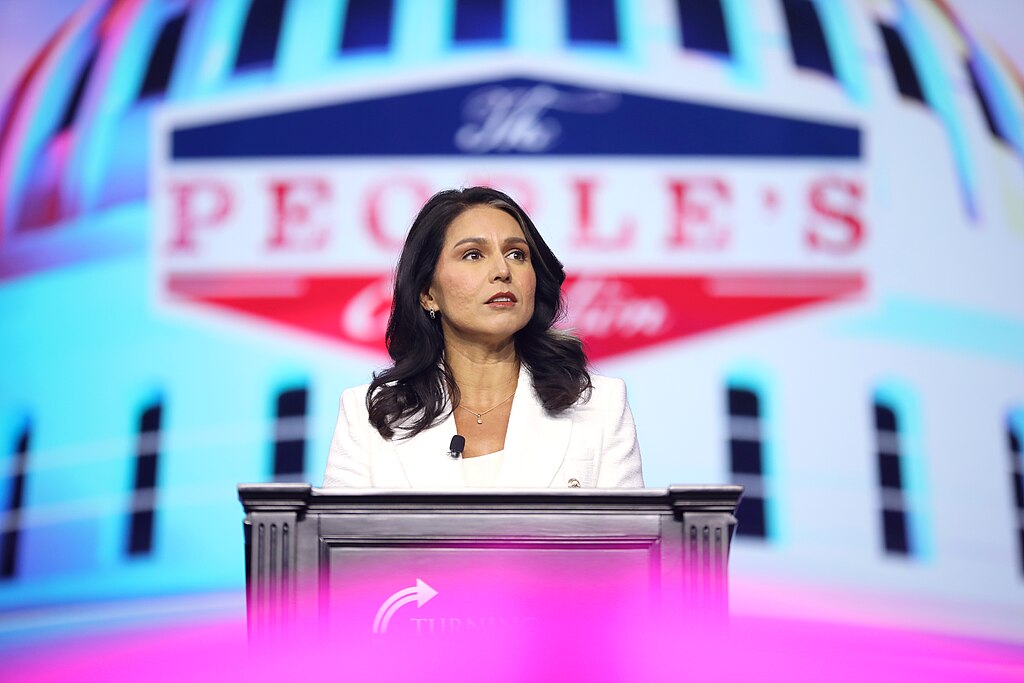Tulsi Gabbard, President Donald Trump's nominee for Director of National Intelligence (DNI), has publicly detailed her departure from the Democratic Party, citing fundamental disagreements over issues of freedom and governance. Her nomination has sparked significant debate, given her political journey and the critical role of the DNI in national security.
Gabbard's Political Evolution
Gabbard, a former Democratic congresswoman from Hawaii, has undergone a notable political transformation. Initially recognized for her progressive stances, she has shifted towards more conservative positions in recent years. In October 2022, she announced her departure from the Democratic Party, criticizing its leadership and direction.
Nomination as Director of National Intelligence
President Trump nominated Gabbard for the DNI position, highlighting her military experience and unique perspective on foreign policy. The nomination has been met with mixed reactions, with supporters praising her independence and critics questioning her qualifications and past foreign policy positions.
Public Reaction
Gabbard's nomination has elicited a range of responses on social media:
-
@LibertyFirst: "Gabbard's shift is refreshing. We need leaders who prioritize freedom over party lines."
-
@ProgressiveVoice: "Her nomination is concerning. Aligning with Trump raises questions about her commitment to democratic values."
-
@NeutralObserver: "It's intriguing to see such a political shift. Her performance as DNI will be telling."
Confirmation Process
Gabbard's nomination will undergo scrutiny in the Senate, where her political evolution and qualifications will be central topics of discussion. The confirmation process will provide a platform for evaluating her suitability for overseeing the nation's intelligence apparatus.
Conclusion
Tulsi Gabbard's nomination as Director of National Intelligence marks a significant moment in her political journey. As the confirmation process unfolds, her past affiliations and current positions will be closely examined, reflecting broader discussions about political alignment and national security leadership.



 Suspected Drone Strike Hits RAF Akrotiri Base in Cyprus, Causing Limited Damage
Suspected Drone Strike Hits RAF Akrotiri Base in Cyprus, Causing Limited Damage  Trump’s Iran Strikes Spark War Powers Clash in Congress
Trump’s Iran Strikes Spark War Powers Clash in Congress  Why did Iran bomb Dubai? A Middle East expert explains the regional alliances at play
Why did Iran bomb Dubai? A Middle East expert explains the regional alliances at play  U.S. Military Strikes on Iran Complicate Xi-Trump Summit and Expose China’s Energy Risks
U.S. Military Strikes on Iran Complicate Xi-Trump Summit and Expose China’s Energy Risks  UK Accepts U.S. Request to Use British Bases for Defensive Strikes on Iranian Missiles
UK Accepts U.S. Request to Use British Bases for Defensive Strikes on Iranian Missiles  Middle East Conflict Escalates After Khamenei’s Death as U.S., Israel and Iran Exchange Strikes
Middle East Conflict Escalates After Khamenei’s Death as U.S., Israel and Iran Exchange Strikes  Pentagon Downplays ‘Endless War’ Fears After U.S. Strikes on Iran Escalate Conflict
Pentagon Downplays ‘Endless War’ Fears After U.S. Strikes on Iran Escalate Conflict  Failure of US-Iran talks was all-too predictable – but Trump could still have stuck with diplomacy over strikes
Failure of US-Iran talks was all-too predictable – but Trump could still have stuck with diplomacy over strikes  Trump to Attend White House Correspondents’ Dinner 2026, Ending Long Boycott
Trump to Attend White House Correspondents’ Dinner 2026, Ending Long Boycott  EU Urges Maximum Restraint in Iran Conflict Amid Fears of Regional Escalation and Oil Supply Disruption
EU Urges Maximum Restraint in Iran Conflict Amid Fears of Regional Escalation and Oil Supply Disruption  Does international law still matter? The strike on the girls’ school in Iran shows why we need it
Does international law still matter? The strike on the girls’ school in Iran shows why we need it  Trump and Merz Meet at White House Amid Iran Strikes and Trade Tensions
Trump and Merz Meet at White House Amid Iran Strikes and Trade Tensions  Trump Announces U.S. Strikes on Iran Navy as Conflict Escalates
Trump Announces U.S. Strikes on Iran Navy as Conflict Escalates  Trump Says U.S.-UK Relationship Has Deteriorated After Starmer Hesitates on Iran Strikes
Trump Says U.S.-UK Relationship Has Deteriorated After Starmer Hesitates on Iran Strikes  Israel Strikes Hezbollah Targets in Lebanon After Missile and Drone Attacks
Israel Strikes Hezbollah Targets in Lebanon After Missile and Drone Attacks  Argentina Tax Reform 2026: President Javier Milei Pushes Lower Taxes and Structural Changes
Argentina Tax Reform 2026: President Javier Milei Pushes Lower Taxes and Structural Changes 































